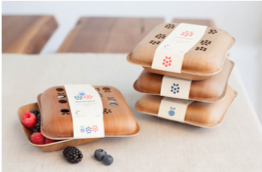This post was written by Kathrin Kaiser ’18
 Sixty-three pounds of plastic, per person, ends up in landfills in the United States. An increased consumer demand for sustainability and the amount of waste coming from disposing packaging makes companies re-think their packaging. They start to incorporate new, sustainable materials and construction methods into their packaging to reduce their impact on the planet. Here’s four clever ideas for companies to reduce their carbon footprint by changing their packaging:
Sixty-three pounds of plastic, per person, ends up in landfills in the United States. An increased consumer demand for sustainability and the amount of waste coming from disposing packaging makes companies re-think their packaging. They start to incorporate new, sustainable materials and construction methods into their packaging to reduce their impact on the planet. Here’s four clever ideas for companies to reduce their carbon footprint by changing their packaging:
- Reducing the ink in company logos
Big brands like McDonald’s or Starbucks might be able to save millions of dollars every year and help preserve the planet just by slightly changing their logos. “Ecobranding” is a project by Sylvain Boyer, a French graphic designer, where he demonstrates the impact of this slight change. A simplified version of the logos could save companies 10-39% in ink and result in additional secondary benefits, such as reduced printing costs and a cut in energy consumption.
- Arekapak
That certain uses of plastic are “evil” is no longer news, not only to environmentalists but also to large corporations. But just banning plastic bags at the register might not be good enough – vegetables and fruits are often shrink-wrapped in plastic, causing tons of landfill. Especially the food industry could benefit from the idea of two female innovators: Arekapak. It is a food packaging alternative, made out of palm leafs and produced with very few water and completely without chemicals. The product is also compostable, heat- and cold-resistant and has a water-resistant surface. And like that wasn’t enough good news, Arekapak packaging serves as a dinner plate, too.
- Edible Packaging
What if you could eat the packaging off your food instead of sending it to a thousand years of landfill doom? An Indonesia-based start-up called Evoware has developed just that. Evoware is a biodegradable, dissolvable, edible packaging wrap made out of seaweed (which is also packed with vitamins!). The company plans to create several variations of the product for instant coffee, sugar and seasonings – the packaging can then just be dumped into the hot water and dissolves. Another upside is that this product could help seaweed farmers raising their revenue and do something good for the environment: seaweed absorbs a great deal of the carbon dioxide in the sea!
- Just eliminate packaging completely
“Original Unverpackt” (“original unpacked”) is a Berlin-based supermarket that works without food packaging. Customers just bring their own containers and have those weighed – they only take what they need and the weight of the containers is being subtracted at the register. The entrepreneurial founder- duo wants to reply to the rising demand for more sustainable products and services and alternatives to the “lavish” handling of resources. Similar concepts exist in Austin, Texas (In.Gredients) and London (Unpackaged). Furthermore, Original Unverpackt hopes to make organic food more affordable for people with lower incomes because of the removal of packaging.
